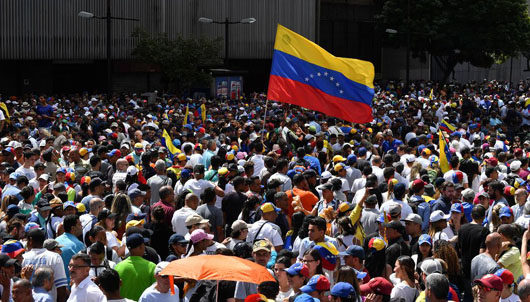by WorldTribune Staff, January 23, 2019
With support from the U.S., opposition leaders in Venezuela have sparked what they hope is the beginning of the end of the socialist regime of President Nicolas Maduro.
Reports on the ground say smaller-scale demonstrations that began on Jan. 21 began to spread on Jan. 22 with protests erupting in more than 60 neighborhoods across Caracas and in interior states.

President Donald Trump recognized Juan Guaido as the interim president of Venezuela minutes after the opposition leader declared himself the head of state, in a dramatic move against the leftist regime of Nicolas Maduro.
Guaido, 35, is the president of the Venezuela National Assembly, which Maduro doesn’t recognize.
In Bolivar state, protesters set on fire a statue of Hugo Chavez, who started the long socialist nightmare in Venezuela and then picked Maduro as his successor before dying of cancer in 2013.
“The silence with which the year started will become a roar of freedom, democracy and strength without precedent,” opposition leader Juan Guaido, a 35-year-old industrial engineer who heads the country’s National Assembly, said on Jan. 22.
Though Maduro stripped the National Assembly of its power in 2017, the body is nevertheless widely recognized internationally as the only democratic institution left in the country.
“We are all here in the same boat, without electricity, without water, without medicines, without gas, and with an uncertain future,” Guaido said. “We’re all immersed in this crisis except the usurper.”
In a video, U.S. Vice President Mike Pence on Jan. 22 called Maduro a “dictator with no legitimate claim to power” and backed the opposition protests as “a call for freedom.”
Pence’s comments, coming after a series of U.S. sanctions on the Maduro regime, prompted Maduro late on Jan. 22 to order a “revision” of diplomatic ties with the United States.
On Wall Street, investors drove up the prices of Venezuela’s defaulted bonds on hopes for a new government that will be more likely to resume debt payments.
For the opposition to succeed, analysts say, it must convince a still faithful military to turn on Maduro, analysts say.
“Only if the protests are massive and cross-class could they demoralize and give pause to people in the military and within the ruling party,” said David Smilde, sociology professor at Tulane University.
A U.S. intelligence official told The Washington Post this month that Maduro’s defense minister, Vladimir Padrino Lopez, has privately told Maduro that he should step aside. And thousands of police and military rank and file have deserted their posts.
“The military leadership is faithful to Maduro and will continue to be until he’s gone,” one active duty high-ranking military officer, who asked not to be identified told Reuters.
However on Jan. 21, dozens of Venezuelan National Guard personnel stole arms from two Caracas units, kidnapped four officials, and recorded themselves in a northern slum urging people to join them in rebellion, the Post reported. The videos circled social media but shortly after, the government announced that 27 dissenting officials had been arrested.
Military installations in Venezuela, like infrastructure throughout the country, are decaying.
More than 4,000 low-ranking officers deserted last year, according to official documents seen by Reuters.
Opposition legislators are reportedly developing an amnesty proposal meant to coax disgruntled military leaders into turning on Maduro, based on what they say are conversations with active officers who are eager for change.
Cliver Alcala, a retired army general who was close to Chavez but fell out with the ruling Socialist Party in 2016, said the disputed inauguration has damaged Maduro’s image among troops.
“The barracks are not totally convinced that Maduro really is president,” said Alcala in a telephone interview with Reuters from Colombia.
Maduro, well aware that the military is keeping him in power, has put officers in charge of key posts in the government and state oil company PDVSA and offered lucrative oilfield services contracts for military-linked firms, Reuters reported.
Military personnel suspected of plotting against the government have been pursued, leading to what human rights groups say is the torture of suspected dissidents and abuse of family members.
Military leaders are “not in the slightest bit concerned about maintaining their professional commitments,” one high-ranking military officer told Reuters. “They’re concerned about protecting themselves.”
Check Out Geostrategy-Direct __________ Jump Start the U.S. Media
